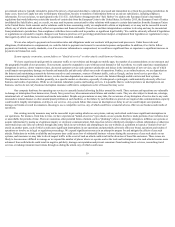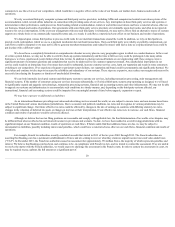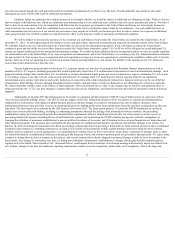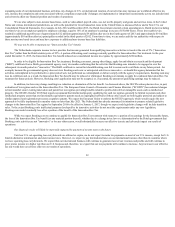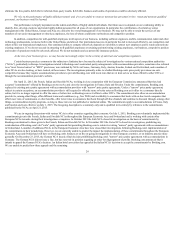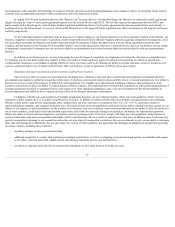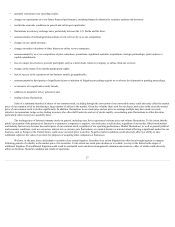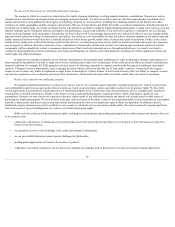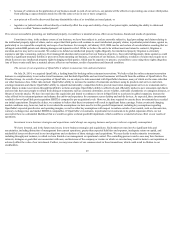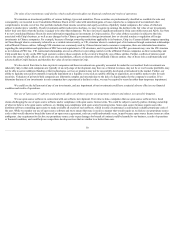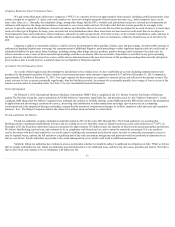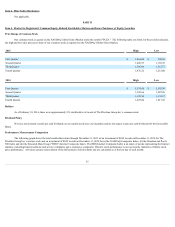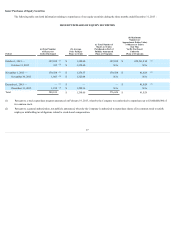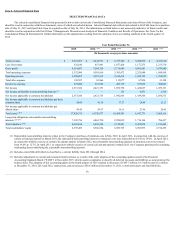Priceline 2015 Annual Report Download - page 32
Download and view the complete annual report
Please find page 32 of the 2015 Priceline annual report below. You can navigate through the pages in the report by either clicking on the pages listed below, or by using the keyword search tool below to find specific information within the annual report.
• because of variations in the application of our business model to each of our services, our patents will be effective in preventing one or more third parties
from utilizing a copycat business model to offer the same service in one or more categories;
• new prior art will not be discovered that may diminish the value of or invalidate an issued patent; or
•legislative or judicial action will not directly or indirectly affect the scope and validity of any of our patent rights, including the ability to obtain and
enforce so called "business method patents".
If we are not successful in protecting our intellectual property, it could have a material adverse effect on our business, brands and results of operations.
From time to time, in the ordinary course of our business, we have been subject to, and are currently subject to, legal proceedings and claims relating to
the intellectual property rights of others, and we expect that third parties will continue to assert intellectual property claims, in particular patent claims, against us,
particularly as we expand the complexity and scope of our business. For example, in February 2015, IBM sued us and certain of our subsidiaries asserting that we
infringed certain IBM patents and claiming damages and injunctive relief. While we believe the suit to be without merit and intend to contest it, litigation is
uncertain and we may not be successful. We endeavor to defend our intellectual property rights diligently, but intellectual property litigation is extremely
expensive and time consuming, and may divert managerial attention and resources from our business objectives. Successful infringement claims against us could
result in a significant monetary liability or prevent us from operating our business, or portions of our business. In addition, resolution of claims may require us to
obtain licenses to use intellectual property rights belonging to third parties, which may be expensive to procure, or possibly to cease using those rights altogether.
Any of these events could have a material adverse effect on our business, results of operations and financial condition.
The success of our acquisition of OpenTable is subject to numerous risks and uncertainties.
On July 24, 2014, we acquired OpenTable, a leading brand for booking online restaurant reservations. We believe that the online restaurant reservation
business is complementary to our online travel businesses, and that both OpenTable and our travel businesses will benefit from the addition of OpenTable to The
Priceline Group. As a result of our acquisition of OpenTable, we are subject to risks associated with OpenTable's business, many of which are the same risks that
our other businesses face. Other risks include: OpenTable's ability to increase the number of restaurants and diners using its products and services and retain
existing restaurants and diners; OpenTable's ability to expand internationally; competition both to provide reservation management services to restaurants and to
attract diners to make reservations through OpenTable's websites and apps; OpenTable's ability to effectively and efficiently market to new restaurants and diners;
and any risks that cause people to refrain from dining at restaurants, such as economic downturns, severe weather, outbreaks of pandemic or contagious diseases, or
threats of terrorist attacks. We have invested since the acquisition and intend to continue to invest in OpenTable to accelerate its global expansion, increase the
value offered to its restaurant partners and enhance the end-to-end experience for consumers across desktop and mobile devices. As expected, these investments
resulted in lower OpenTable post-acquisition EBITDA compared to pre-acquisition levels. However, the time required to execute these investments has exceeded
our initial expectations. Despite the delays, we continue to believe that these investments will result in significant future earnings. Future events and changing
market conditions may, however, lead us to reevaluate the assumptions we have used to test for goodwill impairment, including key assumptions regarding
OpenTable's expected growth rates and operating margins, as well as other key assumptions with respect to matters outside of our control, such as discount rates,
currency exchange rates and market EBITDA comparables. If OpenTable’s investments, in particular its investments in its global expansion efforts, are not
successful, there is a substantial likelihood that we would recognize a related goodwill impairment, which could have a material adverse effect on our results of
operations.
Investment in new business strategies and acquisitions could disrupt our ongoing business and present risks not originally contemplated.
We have invested, and in the future may invest, in new business strategies and acquisitions. Such endeavors may involve significant risks and
uncertainties, including distraction of management from current operations, greater than expected liabilities and expenses, inadequate return on capital, and
unidentified issues not discovered in our investigations and evaluations of those strategies and acquisitions. We may decide to make minority investments,
including through joint ventures, in which we have limited or no management or operational control. The controlling person in such a case may have business
interests, strategies or goals that are inconsistent with ours, and decisions of the company or venture in which we invested may result in harm to our reputation or
adversely affect the value of our investment. Further, we may issue shares of our common stock in these transactions, which could result in dilution to our
stockholders.
29


